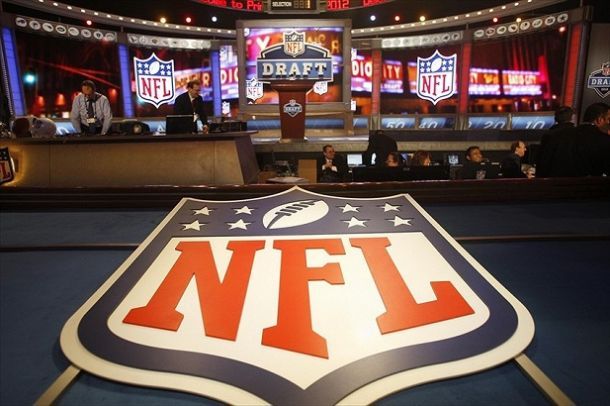For the third draft running, this author compares his mock with others with a rigid scoring system. This year, the participants are:
The author (Jon Fox)
Chris Robbins (VAVEL)
Richard Sena (VAVEL)
Eric Edholm (Yahoo)
Peter King (SI)
Bryan Perez (@Firstroundgrade)
Mike Mayock (NFLN)
Daniel Jeremiah (NFLN)
Jason LaCanfora (CBS)
Charlie Casserly( NFLN)
Evan Silva (rotoworld)
Mike Florio (PFT/NBC)
And a reminder of the scoring:
10 points for getting the pick absolutely right: the right player to the right team at the right pick. Example: Predicting Jameis Winston taken #1 overall to Tampa.
4 points for getting two thirds of the pick right. Example: The Redskins taking Brandon Scherff at a pick other than #5 overall.
-2 points for mocking a pick of a player who wasn’t taken in the first round.
The average scoring this draft was 34.83 points. Exactly 6 mockers surpassed this. In chart form here are the scores:
Ranked in order of finish:
1-Daniel Jeremiah: 52 points. Best call: Shane Ray to the Broncos (4 points)
2-Charlie Casserly: 48 points. Best call: DJ Humphries to the Cards (10 points)
3 (tied)-Peter King: 44 points. Best call: the 49ers trading down for Armstead (4 points)
3 (tied)-Jason LaCanfora: 44 points. Best call: Malcolm Brown to the Patriots (10 points)
5-Bryan Perez: 40 points. Best call: Melvin Gordon to the Chargers (4 points)
6-Eric Edholm: 38 points. Best call: Danny Shelton to the Browns (10 points)
Cut line...
7-Evan Silva: 34 points. Best call: Breshad Perriman to the Ravens (10 points)
8 (tied)-Mike Mayock: 32 points. Best call: Armstead to the 49ers (4 points)
8 (tied)-Richard Sena: 32 points. Best call: Armstead to the 49ers (4 points)
10-Mike Florio: 30 points. Best call: Danny Shelton to the Browns, at a different pick (4 points)
11-Jon Fox: 24 points. Best call: Shane Ray at pick #23 (4 points)
12-Chris Robbins. 0 points. To be fair to Chris, he did this mock very early in the process.
The Top 10 picks ranked by average scoring:
1-#1 Jameis Winston. Average score: 10 points
2-#2 Marcus Mariota Average score: 7.83 points
3-#12 Danny Shelton Average score: 4.83 points
4-#11 Trae Waynes Average score: 4.13 points
5(tied)-#4 Amari Cooper Average score: 3.33 points
5(tied)-#8 Vic Beasley Average score: 3.33 points
7-#4 Dante Fowler Average score: 2.5 points
8-#7 Kevin White Average score: 1.67 points
9-#17 Arik Armstead Average score: 1.33 points
10-#19 Cam Erving Average score: 1.17 points
Conclusions:
-There were some obvious picks in the middle of the first round, but again the majority of points were scored in the top of the first round. Where last year, the majority of points were in the top 10, this year it was the top 12.
-Even the best mock drafter, Daniel Jeremiah, scored only 16% of the points he could have potentially scored.
-Teams value players much differently than even the most plugged in pundits do.
-One big recurring problem that plagued mock drafts, even by insiders, is that teams are reticent to discuss medical red flags on players. This is probably due to privacy/HIPPA concerns where a player could in theory sue a team for claiming that he had a certain type of injury during the draft process when it was unknown. During the draft, the threat of litigation is muted because teams could claim that they passed on a player for other reasons. The two biggest examples of this in the 2015 draft were Leonard Williams and Randy Gregory. It wasn’t common knowledge that Williams’ shoulder had failed some medical checks. It was common knowledge that Randy Gregory had “issues” off the field. They were (and still are) being attributed to pot use, but if you read between the lines, it looks clear that Gregory is suffering from a mental disorder: probably bipolar disorder. No team will talk about it openly though and speak in only vague generalities.










































